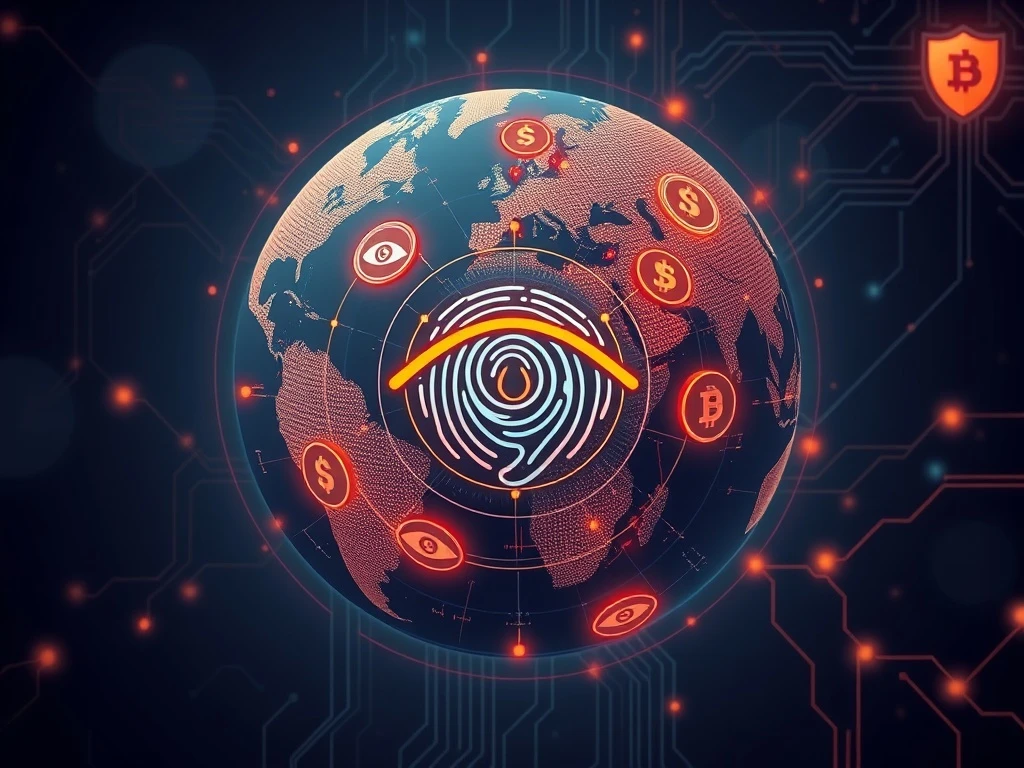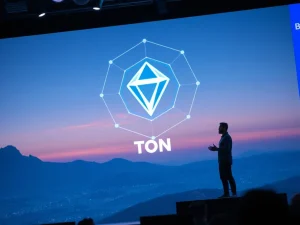Perilous Unbacked Crypto Loans: Divine Research’s World ID Experiment Faces 40% Default Rate

The world of decentralized finance is constantly pushing boundaries, but what happens when innovation meets high-risk lending? San Francisco-based Divine Research has recently ignited a stir in the crypto community by issuing approximately 30,000 unbacked crypto loans, leveraging OpenAI CEO Sam Altman’s iris-scanning identity verification platform, World ID. This bold move, targeting underserved international borrowers with microloans under $1,000, comes with a staggering 40% default rate, raising critical questions about the future of uncollateralized crypto lending. Is this a revolutionary step towards financial inclusion, or a perilous gamble echoing past industry failures?
Diving Deep into Unbacked Crypto Loans: Divine Research’s Bold Strategy
Divine Research, founded by Diego Estevez, is venturing into a segment of the market that traditional finance often overlooks: individuals lacking access to conventional credit. Since December 2024, the firm has distributed thousands of short-term microloans, primarily in USDC stablecoin, with interest rates ranging from 20% to 30%. Estevez describes this approach as “microfinance on steroids,” aiming to empower teachers, vendors, and others typically excluded from legacy banking systems. Unlike traditional crypto lending, which often relies on overcollateralization to mitigate risk, Divine Research’s model embraces unbacked crypto loans, a significant departure that relies heavily on a novel identity verification method.
The core of Divine’s risk mitigation strategy lies in its innovative use of World ID. By integrating Sam Altman’s biometric identity platform, Divine aims to prevent borrowers from creating multiple accounts after defaulting, a common challenge in uncollateralized lending. Additionally, the firm issues World tokens that can be partially reclaimed if repayments fail, providing another layer of risk management. This unique blend of high-interest microfinance and advanced decentralized identity tools positions Divine Research at the forefront of a new wave of crypto lending experiments.
The World ID Factor: Revolutionizing Decentralized Identity?
The integration of World ID into Divine Research’s lending model highlights a growing trend: the use of decentralized identity (DeID) solutions to solve real-world financial challenges. Sam Altman’s Worldcoin project, with its controversial yet widely adopted iris-scanning technology, aims to create a global identity and financial network. For Divine Research, World ID replaces traditional credit scoring, offering a biometric-based verification that theoretically prevents fraud and enables access for those without a credit history.
But how exactly does World ID function in this context? It provides a unique, verifiable digital identity for each user, making it difficult for individuals to game the system by taking out multiple loans under different guises after defaulting. This mechanism is crucial for an unbacked lending model, where the primary collateral is the borrower’s identity and reputation. The success or failure of Divine’s model could significantly influence the adoption and perception of decentralized identity solutions in broader financial applications, especially in emerging markets where traditional identity infrastructure is lacking.
Navigating High Default Rates and High Interest: Is It Sustainable?
One of the most striking figures from Divine Research’s operations is the reported 40% default rate for first-time borrowers. In traditional finance, such a figure would be catastrophic. However, Estevez contends that these high default rates are offset by the equally high interest rates, ranging from 20% to 30%. He asserts that the system is “engineered for profit,” with the expected losses from defaults already factored into the pricing model. This approach is reminiscent of high-interest payday loans or certain microfinance initiatives, but scaled with crypto and DeID.
This raises a fundamental question: is such a model sustainable in the long run? While high interest rates might cover losses in the short term, they also contribute to the high default rates themselves, creating a precarious cycle. Borrowers struggling to repay face mounting debt, potentially leading to further defaults. The long-term viability of Divine Research’s strategy hinges on its ability to refine its risk assessment, perhaps through advanced AI-driven analytics, and to foster a culture of repayment among its target demographic. The intersection of high-risk crypto lending and social impact remains a delicate balance.
Beyond Divine Research: A Shifting Landscape for Crypto Lending
Divine Research is not operating in a vacuum. The broader crypto lending landscape is undergoing significant evolution, driven by technological advancements and lessons learned from past failures. The notorious 2022 collapse of major crypto lenders like Celsius and Genesis, which resulted in billions in losses and a $2 billion lawsuit, cast a long shadow over the sector. These failures were largely due to opaque practices and overleveraged collateral-based models.
However, the industry is now seeing new entrants experimenting with diverse approaches to crypto lending. Competitors like 3Jane and Wildcat are also exploring unbacked or undercollateralized credit models:
- 3Jane: Recently raised $5.2 million, this firm requires income or asset verifications but no traditional collateral. They plan to deploy AI agents to enforce repayment rules and even sell defaulted loans to U.S. debt collectors, highlighting a move towards AI-driven automation in risk management.
- Wildcat: Focuses on offering undercollateralized loans specifically to institutional traders, a different risk profile from Divine’s microloan target.
These models signify a broader shift towards AI-driven automation and alternative risk assessments, moving beyond the simple collateral-based lending that dominated the earlier crypto cycles. JPMorgan’s recent exploration of Bitcoin-backed loans, while cautious and collateralized, signals a growing institutional interest that contrasts sharply with Divine’s unsecured approach, illustrating the diverse directions the industry is taking.
Regulatory Scrutiny and the Future of Uncollateralized Crypto Lending
The absence of collateral and elevated interest rates in Divine Research’s model inevitably attract regulatory attention. Following the high-profile collapses of Celsius and Genesis, regulators worldwide are scrutinizing crypto lending practices more closely. The unique nature of unbacked crypto loans, especially those leveraging decentralized identity tools, presents new challenges for existing financial regulations. Questions arise regarding consumer protection, anti-money laundering (AML) compliance, and the classification of these financial products.
Political tailwinds, including support from figures like former U.S. President Donald Trump for crypto innovation, might offer some breathing room, but robust regulatory frameworks are likely to emerge as the sector matures. The long-term sustainability of models like Divine Research’s will depend not only on their profitability but also on their ability to navigate complex legal and compliance landscapes. Estevez’s vision of balancing innovation with systemic risk is ambitious. If successful, it could truly disrupt financial inclusion; if not, it risks amplifying market volatility and repeating the mistakes of the past.
Divine Research’s bold experiment with unbacked crypto loans and World ID is a fascinating case study in the evolving landscape of decentralized finance. While the high default rates present a significant challenge, the innovative use of biometric identity and AI-driven risk mitigation offers a glimpse into a future where financial services are more accessible to underserved populations. The success of this model, and others like it, will undoubtedly shape the regulatory discourse and the broader adoption of decentralized identity solutions. As the crypto lending sector continues to mature, balancing innovation with robust risk management and regulatory compliance will be paramount for sustainable growth.
Frequently Asked Questions (FAQs)
What are unbacked crypto loans?
Unbacked crypto loans are a type of cryptocurrency loan that does not require the borrower to provide collateral (such as other cryptocurrencies or assets) to secure the loan. Instead, lenders rely on other methods like identity verification, reputation, or alternative credit assessments to evaluate risk, as seen in Divine Research’s model.
How does Divine Research use World ID for its loans?
Divine Research uses Sam Altman’s World ID, an iris-scanning identity verification platform, to uniquely identify borrowers. This helps prevent individuals from creating multiple accounts to take out additional loans after defaulting, effectively replacing traditional credit checks with biometric verification for risk mitigation.
Why does Divine Research have a 40% default rate, and how do they manage it?
Divine Research reports a 40% default rate for first-time borrowers. Founder Diego Estevez states that this high rate is factored into their business model, with high interest rates (20-30%) designed to offset the losses from defaults. The system is engineered to be profitable despite these significant defaults.
What are the risks associated with unbacked crypto loans?
The primary risk is the lack of collateral, which means lenders face significant losses if borrowers default. For borrowers, high interest rates can lead to a cycle of debt. The sector also faces regulatory uncertainty and the potential for systemic risk, as demonstrated by past crypto lending failures.
How does Divine Research compare to other crypto lenders like 3Jane or Wildcat?
Divine Research focuses on unbacked microloans for underserved international borrowers using World ID. 3Jane also offers uncollateralized loans but requires income/asset verification and plans to use AI for enforcement. Wildcat provides undercollateralized loans specifically to institutional traders. Each firm represents a different approach to managing risk in the evolving crypto lending space.
What is the broader impact of decentralized identity (DeID) in crypto lending?
Decentralized identity tools like World ID aim to provide verifiable digital identities without relying on centralized authorities. In crypto lending, DeID can enable financial inclusion for unbanked populations by offering alternative credit assessment methods, prevent fraud, and potentially build reputation-based lending systems in the future.








